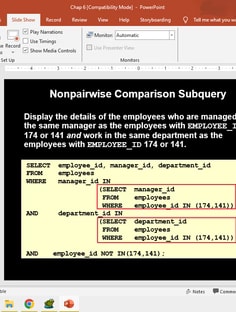Certified online Computer Science tutor
Learn computer science with expert online tutors
From basics to advanced logic – online computer science help
Online computer science tutoring data
Total Online Computer Science tutors
854 Computer Science tutors available
Expert Online Computer Science tutors
75% hold a Master’s degree
Online Computer Science Industry experience
65% of tutors have worked in software development
Online computer science classes, a students guide
All about learning computer science online
Computer Science includes complex topics like data structures, algorithms, operating systems, and networks.
Offline learning can be tough due to fixed schedules, outdated books, and limited practice. Concepts like recursion, memory management, and dynamic programming need interactive visuals, which traditional methods often lack. Additionally, debugging code without immediate guidance can slow down progress.
Online learning solves these problems with platforms like LeetCode, Coursera, and Udemy. They offer video tutorials, coding exercises, and AI-powered feedback. Interactive coding tools like Replit and Jupyter Notebook let learners practice and test code.
Forums like Stack Overflow and GitHub Discussions provide quick peer support, ensuring continuous learning. Studies show e-learning boosts retention by 25%-60%, making it more effective. Online computer science tutoring provides real-time, personalized guidance. It helps students clear doubts and improve problem-solving skills.
Self-paced courses, virtual labs, and expert-led tutorials deepen understanding while building real-world coding skills efficiently.
The advantages of choosing online computer science tutoring
Online tutoring provides structured, personalized guidance, essential for mastering Computer Science.
One-on-one lessons help students understand tough topics like object-oriented programming (OOP), cryptography, data structures and algorithms, and machine learning. Online computer science tutors use live coding, real-time debugging tools, and interactive whiteboards to simplify complex algorithms.
Flexibility is a key benefit. Students can schedule sessions at their convenience, saving commute time. Tutors adjust lessons to each student’s pace and reinforce learning with coding challenges on platforms like HackerRank and Codeforces. Instant feedback ensures errors are corrected immediately, preventing misunderstandings.
Additionally, project-based learning in online computer science tutoring helps students build portfolios, crucial for job interviews and internships. Whether preparing for technical interviews or academic exams, online computer science tutoring accelerates learning.
How to select a perfect online computer science tutor
Start by setting your learning goals, whether it's Python, DSA or cybersecurity. Choose a computer science tutor with a Computer Science degree, software development experience, or certifications like AWS, Google Cloud, or Microsoft Azure.
Check for 4+ star ratings and positive reviews to gauge effectiveness. Make sure the tutor is skilled in coding platforms like LeetCode, IDEs like VS Code and PyCharm, and debugging tools like GDB.
Look for structured lessons with real-world projects, coding challenges, and hands-on problem-solving to enhance learning. One-on-one tutoring provides personalized attention and instant doubt resolution.
Consider the tutor’s cost and choose one that fits your budget. Always opt for a free trial session to evaluate teaching style.
Platforms with flexible tutor switching, like Wiingy’s Perfect Tutor Match Guarantee, help find the best fit. Wiingy offers expert-vetted computer science tutors at an average of $28 per session, ensuring quality education at an affordable price.
Frequently asked questions
Where can I find quality online resources to learn computer science?
Which core computer science concepts are best taught through online learning platforms?
How can an online computer science tutor support my project work?
In what ways can an online computer science tutor help identify and correct errors?
How can I get help from online computer science tutors for my job interview?
How can an online computer science tutor benefit my learning?
Can I schedule tutoring sessions according to my availability?
How do you choose the right online computer science tutor for your needs?
























